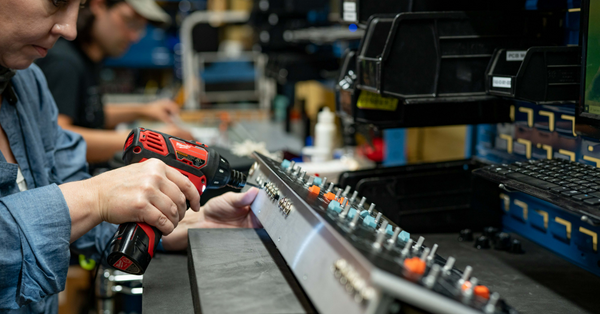The Iconic Analog Synth is Back!
It is an exciting day for collectors and synthesis enthusiasts alike. The Moog Minimoog Model D Synthesizer is back, in its original glory and then some. Many years have passed since the last production run in 2016 of the coveted Minimoog, and Moog has brought one of the most sought-after Synthesizers back into production once again. No corners were cut here either. The 2022 Minimoog Model D reissue features the same signal path and audio components as the original from 1970. Each synthesizer is built using classic through-hole construction and component placement that is identical to the classic Minimoog.
Minimoog Origins
In 1970, Moog introduced the Minimoog to the world, which was revolutionary in size and design. Synthesizers since their inception were exceptionally large, expensive, and difficult to use. Unlike what we envision as a standard synthesizer today, they were fully modular, and used patch cables to create sounds and route between different sound sources, envelopes, LFO’s and other modules. While modular synthesizers are immensely powerful machines and are still used today, it posed some challenges for the working, touring musician. The Minimoog, a flagship from the Moog Synthesizers, was the first of its kind; a compact, affordable, keyboard driven synthesizer that took inspiration from the highly praised Moog modular synthesizer's signature sound. It quickly became a hit with many musicians and was used by highly influential artists throughout its lifetime. The Minimoog ended up becoming the blueprint for all electronic keyboards that followed. There was nothing like the Minimoog, and to this day the original vintage units are highly sought after and coveted instruments.

Why Is it so Special?
As stated above, the Minimoog became the poster child for synthesizer designs and was a radical new way for musicians to get their hands on a new tool that set them apart from the rest of the crowd. At the time, Synthesizers were difficult to use, and were fully modular systems that cost a boat load of money, even in today's standards. In addition, they were gigantic pieces of equipment that were hard to transport.
The Minimoog made it possible for more musicians to get their hands on a synthesizer and revolutionize music and technology as we know it today. Whether it was the prog rock musicians such as Geddy Lee from Rush or Rick Wakeman from Yes, Bernie Worell from Parliament Funkadelic and Talking Heads, or even the legendary jazz musician Herbie Hancock, the Minimoog found a place across many unique musicians who were pushing music ahead in the 1970’s. Its unique flexibility and sound made the Minimoog famous for its thunderous bass, and its highly expressive lead sounds. Musicians liked this synthesizer's design; it was simple, with a wide variety of sound shaping capabilities and Moog brought some innovative technology to the table. Something that is a standard feature on every synthesizer thereafter was the pitch wheel. A way to bend notes in-between the lines and add an expressive element to pitch that had never been available before.

The Filter
Thanks to a mistake while designing the Minimoog, which was never found until production started on the instrument, the most sought after Low-Pass Ladder Filter by gear heads alike was created. The Minimoog had this unbelievably fat and larger than life sound that was achieved accidentally by driving the input of the Low-Pass filter by almost 12db. This accident caused the filter section to saturate and become the most interesting and coveted filter still to this day. There is nothing that quite sounds like the Minimoog, and the filter is a huge part of its unique sound.

A Legend Returns
It has been many years since the last limited release of the Minimoog, and today the Minimoog is back and available for purchase once again. Moog took great care and consideration while re-releasing this synthesizer. The 2022 Model D reissue is an exact replica of the original from 1970, without cutting corners or sacrificing sound quality. Built using the same through-hole circuit design and housed in an incredibly classy locally sourced Appalachian cherry wood cabinet, the Minimoog Model D is nothing short of a masterpiece. While Moog kept the Minimoog as close as possible to its original design, the engineers working on the project made some wonderful quality of life improvements to the 2022 reissue. An analog LFO with selectable waveshapes has been added, and the keyboard is a high quality Fatar keybed that offers velocity and after-touch which is available via the CV jacks. In addition, Moog has added full MIDI integration, and an internal mixer feedback mod which eliminates the need for external routing for that classic Minimoog overdrive. Lastly, for the first time ever, the Minimoog Model D is now built using a spring-loaded pitch wheel with a center deadband. A long-awaited request from players that brings an improved user experience while utilizing the pitch wheel. While none of these modifications are original to the 1970s built Model D, they are quintessential to modernizing the instrument while keeping its originality intact. The Minimoog Model D 2022 Reissue is available today via Pre-Order from Russo Music and our first units are slated to ship later this winter.








